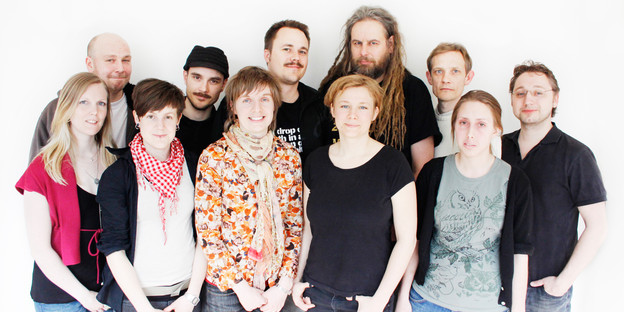Sweden, Stockholm: Fria Tidningen
Fria Tidningen is an independent alternative to the conservative newspapers. Focus on environmental issues, democracy, animal rights and social justice.

The Editors. Bild: Fria Tidningen
Since 2001 Fria Tidningen is an independent alternative to the conservative newspapers that dominate the Swedish market. We focus on issues that are neglected by the mainstream press: environmental issues, equality, democracy, freedom, peace, animal rights and social justice. In the beginning the newspaper was released once a week and had its base in Stockholm. In 2008 it became a national newspaper. Since 2010 it is realeased twice a week and the ambition is fime times a week by the end of 2012.
Our main competitors are the major mainstream newspapers in Stockholm (DN and SvD) and Gothenburg (GP) as well as weekly newspapers that are published by left-wing parties and organisations (such as Arbetaren, ETC and Flamman). Distribution is difficult, since in Sweden we have a monopolistic system in the major cities.
Our typical reader is a politically active intellectual who lives in Stockholm or Gothenburg and who is looking for an alternative to the mainstream media. All our departments focus on our main issues, human rights, environment, etc, and we prioritise features about migrants rights, solidarity work, environmental activism, etc., We also offer unique and in depth analysis of national and international politics.
Authors, intellectuals, artists
Our regular columnists are respected authors, intellectuals, artists and political activists. We have 45 employees and approximately 50 freelance writers. In a series of articles we published before the 2010 elections in Sweden, all political parties gave their answers on various policy topics – both the broader public policy issues and on our main issues such as foreign policy, welfare, gender and energy policy.
Each part contained an article based on interviews with people linked to the questions in different ways and what challenges and solutions they saw. Our main challenge. We need more capital in order to be able to have more stories that are investigated by ourselves.
Where we want to be in five years: Our wish is to be a serious contender to the dominant mainstream newspapers both in terms of circulation and outreach. Our news are echoed in other media and shake up the leaders of the political and corporate world. Our opinion pieces inspire people to take action for a better world and put pressure on politicians to work for a more just society.
The Cooperative Society
We have always been a cooperative because this is symbolic of how we believe all companies, and society as a whole, should be organised. People should have more power over their lives, both at work and in society.
The Cooperative Society was founded in 2001 with five members and an initial capital of 5.000 Euro. Today we are in debt by 40.000 Euro. Last year, 2011, we managed to turn a profit for the first time in several years and we also have forecasted profit for 2012.
To become a member you have to be employed by the newspaper, so all members work within production or administration of the company. The members yearly meeting is also the supreme governing body. We do accept new members. We pay wages and all employees are payed the same salary regardless of their position or how long one has been employed.
We would use the money to implement a strong campaign for the cooperative society, which we want to grow bigger – more people, more energy and activity, stronger finance. Our vision is to have the cooperative society work like it does at taz, and engage in projects on top of producing newspapers such as work shops, travels, studies, seminars and so forth.
